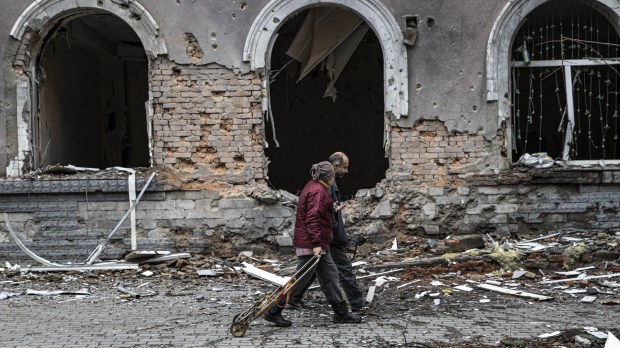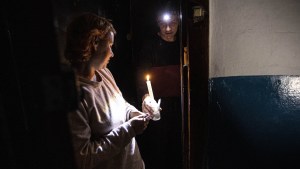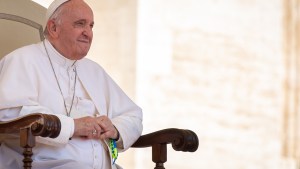Pope Francis released a letter to the people of Ukraine on Thursday, expressing his sorrow for the suffering they are enduring and encouraging them to see their trial in the light of the mystery of God’s incarnation at Christmas.
“In a few weeks it will be Christmas, and the cry of suffering will become even more palpable,” Pope Francis wrote, in a letter dated November 24, exactly nine months after Russia launched a full-scale invasion of Ukraine. “And I would like to return with you to Bethlehem, to the trials that the Holy Family had to face on that night that seemed only cold and dark. Instead, light came: not from men, but from God; not from earth, but from Heaven.”
The letter was published on the Vatican website in Italian and Ukrainian – apparently the first time the Vatican portal has published a Ukrainian translation of a papal letter. A Vatican translation into English is not yet released at the time of publication.
Litany of horrors
The pope described a litany of horrors that have taken place in Ukraine in the nine months since Russian President Vladimir Putin launched what he called a “special military operation” – torture, destroyed buildings, rape, the death of children, and the massive displacement of peoples, either refugees or internally displaced persons or people who have been forcefully taken to Russia. Francis said that “an absurd, insane war was unleashed on your land.”
“Indeed, the cross on which the Lord was tortured is again manifested in the horrific tortures we see on corpses, in the mass graves discovered in different cities, in these and in many other bloody pictures that burst into our souls and raise the cry: Why? How can people treat other people like this?” the pontiff asked.
Of the children who have been killed or wounded, orphaned, or deported to Russia, he said, “in each of them, all humanity is defeated.”
But he lauded the Ukrainian people for not giving up.
“The world has discovered a brave and strong people who suffer and pray, cry and fight, resist and hope — a long-suffering and noble people,” Francis wrote. “I continue to be close to you with my heart and prayer, with human care, so that you feel accompanied, so that you do not get used to war, so that you do not remain alone today, and especially tomorrow, when you may be tempted to forget about your suffering.”
He concluded the letter with a prayer. “May His Mother and ours, the Mother of God, watch over you. To Her Immaculate Heart, in unity with the bishops of the whole world, I consecrated the Church and humanity, in particular your country and Russia. To Her Maternal Heart I offer your suffering and your tears. In the One who, as the great son of your land wrote, ‘brought God to our world,’ let us not tire of asking for the longed-for gift of peace, confident that ‘nothing is too great for God’ (Luke 1:37). May He fulfill the just expectations of your hearts, heal your wounds and give you His comfort.”
Fatherly closeness
Reacting to the letter, the head and father of the Ukrainian Greek Catholic Church, Major Archbishop Sviatoslav Shevchuk, called the letter “unprecedented” and thanked Pope Francis for his “fatherly closeness to the Ukrainian people.”
“During my meeting with the Holy Father, which took place on November 7 in the Vatican, I told him about the pain and suffering of the Ukrainian people, presented to him the terrible consequences of the crimes of Russian soldiers against civilians, spoke about the humanitarian catastrophe and entrusted him with the prayers and care of our long-suffering people. I asked the Holy Father to show our people a gesture of his fatherly care and closeness.”
Archbishop Shevchuk, who got to know Pope Francis when he led the Ukrainian Catholic community in Argentina from 2009 to 2011, said that for Ukrainians, the pope’s letter is “extremely important, because the leaders of the aggressor state have denied our right to exist, our identity, culture, language, Church. And Pope Francis addresses this nation, which they want to take away, … recognizes the sovereignty … of our state.”
Last summer, in a move that now seems to have served as a prelude to invasion, Putin published a 5,000-word essay arguing that Russia and Ukraine are essentially one nation. Even now, prominent voices in Russia are making similar arguments.
“Moscow City Duma Deputy and pro-Kremlin journalist Andrey Medvedev posted a long rant to his Telegram channel on November 23 wherein he categorically denied the existence of the Ukrainian nation, relegating Ukrainian identity to a ‘political orientation,” said the Institute for the Study of War, a think tank that issues a daily briefing on the Ukraine conflict.
“Putin’s speech at the Valdai Discussion Club on October 27 again rejected Ukraine’s sovereignty, noting that Russia ‘created’ Ukraine and that the ‘single real guarantee of Ukrainian sovereignty’ can only be Russia” ISW said.



